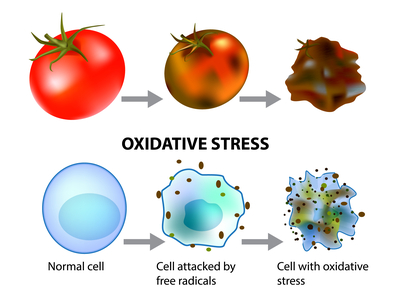Description
Effective for Patients Experiencing:
Since oxidative stress can affect cellular function in many body systems, it has been associated with numerous conditions including:
- Chronic Pain/Inflammatory Conditions
- Cardiovascular Disease
- Aging and Neurodegenerative Conditions
About the Oxidative Stress 2.0 (Urine) profile
Biomarkers of oxidative damage can be found in the urine. The Oxidative Stress Analysis 2.0 (Urine) measures these compounds:
- Lipid Peroxides – reflective of oxidative damage to polyunsaturated fatty acids (components of cell membranes)
- 8-OHdG – reflective of oxidative damage to DNA The Oxidative Stress 2.0 Urine test results are displayed using colorimetric reporting, allowing a quick determination of patient need for antioxidant support.Clinical Overview
What is the Oxidative Stress 2.0 (Urine) Profile?
The Oxidative Stress 2.0 (Urine) evaluates two key biomarkers for oxidative damage. In the course of normal human activity — energy production, detoxification of environmental pollutants, and immunologic defense mechanisms — highly reactive molecules known as free radicals are produced. This effect is naturally counterbalanced in a controlled manner by the body’s antioxidant systems and the dietary antioxidants found in foods.
When production of free radicals becomes excessive, the antioxidant mechanisms of the cell become overwhelmed and free radical action is not controlled, leading to impaired cell function. Oxidative stress is a condition in cells where excessive production of free radicals damages cellular components. Potential targets include lipid membranes, proteins (leading to enzyme inactivation or receptor malfunction), and DNA (leading to mutations and potential cancers).
Oxidative Stress 2.0 (Urine) uses a simple urine test to evaluate two key biomarkers of oxidative stress:
- Lipid Peroxides – reflective of oxidative damage to polyunsaturated fatty acids (components of cell membranes)
- 8-OHdG – reflective of oxidative damage to DNA
The Oxidative Stress 2.0 Urine test results are displayed using colorimetric reporting, allowing a quick determination of patient need for antioxidant support.
What Advantage Does the Oxidative Stress 2.0 (Urine) Profile Offer Compared to Other Diagnostics?
Measurement of oxidative stress biomarkers in urine is a patient-friendly non-invasive approach to evaluating levels of damage being produced by free radicals and the need for additional antioxidant support. This profile is also a convenient tool to monitor response to therapies.
What Can Clinicians and Patients Expect from Oxidative Stress 2.0 (Urine) Testing?
Assessment of urine biomarkers for oxidative-stress damage can indicate the functional need for dietary and/or lifestyle modifications and provide guidelines for customized antioxidant supplementation, which can help minimize future oxidative damage.
Test Type: Urine Test

